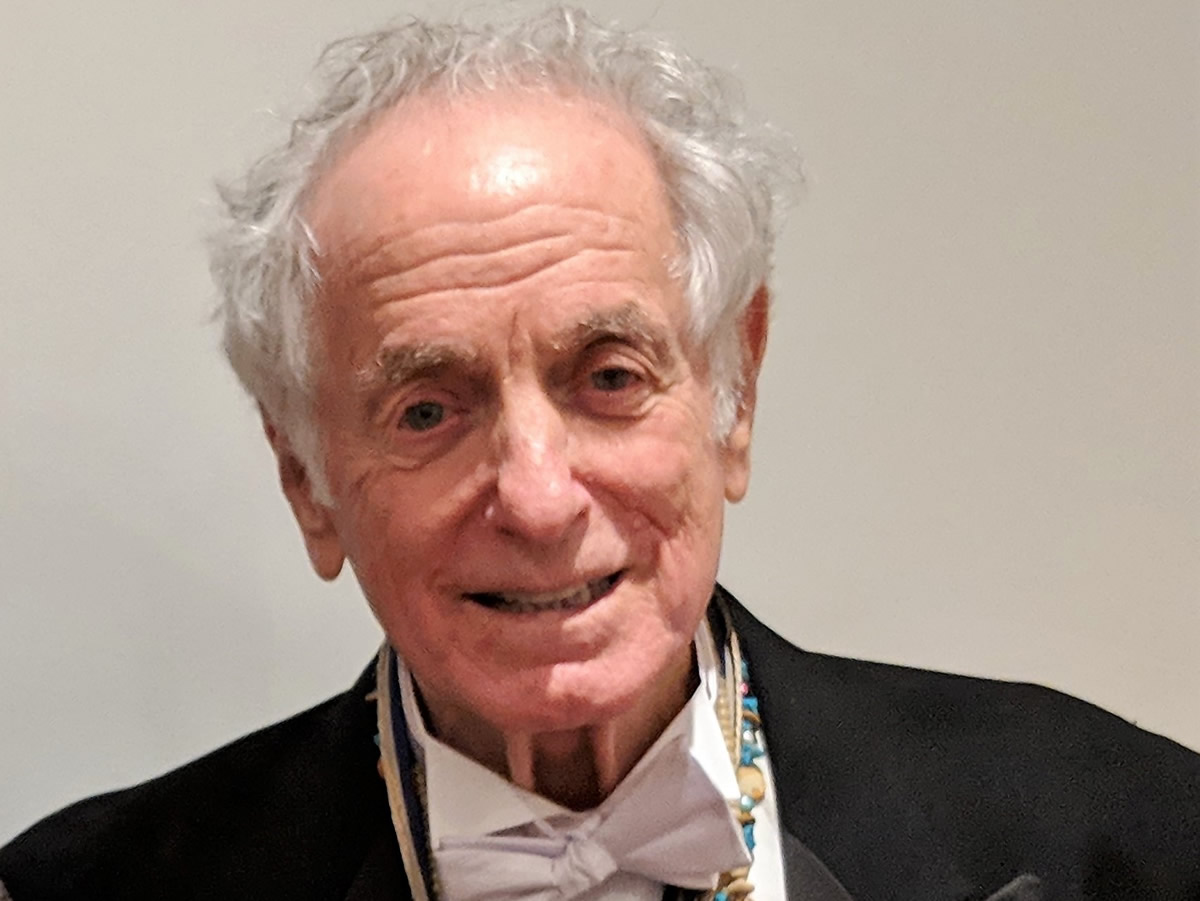David Amram moved to NYC in 1955 to study composition on the GI Bill at the Manhattan School of Music. He has spent the last 70 years working as a classical composer of major stature with over 100 orchestral, choral, chamber works and two operas. Since Leonard Bernstein chose him as the New York Philharmonic’s first-ever Composer in Residence for its 1966-67 season, David has collaborated with (and had his classical works performed) by Eugene Ormandy, Sir James Galway, Pinchas Zukerman, and scores of other outstanding interpreters around the world. He is now recognized as one of the most influential and versatile composers of his generation.
As a pioneer of jazz French horn, he performed and recorded with Charles Mingus, Lionel Hampton, Oscar Pettiford, Paquito D’Rivera, Betty Carter, Tito Puente, Kenny Dorham, T S Monk, and Arturo Sandoval. As a conductor, he was musical director for Brooklyn Academy’s Young People’s Schooltime programs with the Brooklyn Philharmonic for 29 Years, as well as for their parks and family concerts. He conducted members of the Metropolitan Opera Orchestra as Musical Director of the International Jewish Arts Festival of Long Island, and has guest conducted major orchestras in the US, Canada, and around the world.
For the theatre, he was the first Composer in Residence and Music Director of The Lincoln Center’s Repertory Theater for their first three seasons, when he composed the scores for Arthur Miller’s After the Fall and Incident at Vichy, as well as scores for over 20 plays on Broadway. Off-Broadway, he was Composer-in-Residence for Joe Papp’s free Shakespeare in the Park productions for their first 12 seasons and was awarded a Lifetime membership of the Actors Studio for his work with Elia Kazan, Harold Clurman, and Estelle Parsons.
Among his 20 film scores, highlights include the music he composed, orchestrated, performed in and conducted for the original Manchurian Candidate, Splendor in the Grass and Robert Frank’s influential short, Pull My Daisy, narrated by Jack Kerouac who chose Amram to compose the jazz-chamber music score and to appear in the film as Mezz McGillicuddy, the deranged French hornist. A five-CD box set brings together films scored by Amram since 1966.
Since he and Jack Kerouac performed the first-ever public jazz poetry readings held in NYC at the old Circle in the Square Theater in December of 1957, Amram has collaborated with a broad range of poets, authors, and rappers and continues to do so today.
He began composing formal pieces setting words for choral music with authors and poets like Langston Hughes, John Steinbeck, John Dos Passos, Thomas Wolfe, Sonia Chavez, and both Robert and John Kennedy and Shakespeare’s words (for the opera 12th Night). He also set sacred texts from the Old and New Testaments in both English and Hebrew.
David has used the skills acquired from working with Kerouac in accompanying spontaneous poetry readings and has played over the past 68 years with hundreds of new poets, readers, and singer-songwriters throughout the US, Canada and in every country he visited. He often accompanied Pete Seeger, whom he first met in 1948 at a Henry Wallace rally, and later Theodore Bikel, the Clancy Brothers, Odetta, Loudon Wainright, Tom Chapin, Floyd Red Crow Westerman, and today’s wizards like Israel’s David Broza, Oklahoma’s brilliant John Fullbright and the peerless Red Dirt Rangers, and Texas stalwarts Willie Nelson, Steve Earle, and Butch Hancock.
Amram’s own books, Vibrations: A Memoir, Offbeat: Collaborating with Kerouac, and Upbeat: Nine Lives of a Musical Cat, are all online and available in paperback published by Routledge/Taylor & Francis. So too is the latest book about him, The Many Worlds of David Amram: The Renaissance Man of American Music, edited by Dean Birkenkamp with essays by conductors Eugene Ormandy and Joanne Falletta, classical soloists Elmira Darvarova, Howard Wall, and Ken Radnofsky, plus articles by Arturo O’Farrill, Hugh Ragin, Mark Meyers, Mark Morganelli, and Louis Mofsie, leader of the Thunderbird Dancers. An essay on “The Village, and the Man Who Makes It Live on” by Village Trip founder Liz Thomson examines Amram’s centrality to the life and culture of Greenwich Village and the East Village across more than seventy years.
New albums of his music will be issued in November by Naxos Records: A 95th birthday album featuring two compositions from 1960, Piano Sonata, performed by Thomas Weaver, and Violin Sonata, on which Weaver is joined by Elmira Darvarova. For the final piece, Darvarova chose to record her interpretation of Amram’s unaccompanied violin piece Voyages, composed for her in 2024. And Nora Guthrie, Woody’s daughter, plans on issuing a recording of Amram and his quintet performing new versions of Woody’s classic story-songs.
Everywhere he goes today, David Amam tries to share the blessings bestowed upon him, and all the upcoming celebrations of his 95th Birthday make him realize that premature expiration is highly overrated.
September 19 @ 7:00 pm – 9:30 pm
Village Voices: With James Martin, baritone & Lynn Raley, piano World Premières of New Work by David Amram, Carman Moore & Maria Thompson Corley
September 21 @ 7:00 pm – 9:30 pm
Bernstein Remix! A Benefit for Artful Learning

